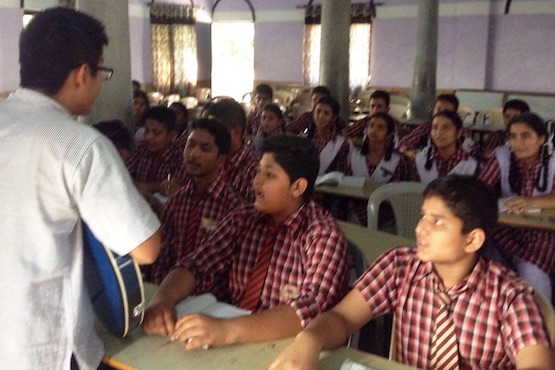Diocese launches peace program for students on Indo-Pak border
Jammu-Srinagar Diocese helps students make sense of the conflict between the two nuclear-rival neighbors
Jul 25, 2017

SRINAGAR: Jammu-Srinagar Diocese has launched a project to educate young people on the need for peace on the Indian side of the India-Pakistan border where hostilities between the two countries have killed hundreds of people.
The diocese covers the entire Indian state of Jammu and Kashmir, a disputed territory between the two neighboring countries. Both India and Pakistan claim the region and each administer part.
The two nuclear-power rivals have fought at least three major wars over Kashmir. The border area is prone to occasional exchange of fire between the armies of India and Pakistan, often adversely impacting the local people living there. The region has been a sensitive issue for both India and Pakistan ever since they become two different nations in 1947 when British rule ended in the subcontinent.
The diocese's peace project is "an effort to foster friendship and oneness by accepting that we belong to one human family," said Father Saiju Chacko, director of Catholic Social Service Society, Jammu-Srinagar Diocese's social service wing. The project funded by Caritas India, is called "Maitri Abhiyan" (peace movement).
Anita Sharma, a ninth grader from Holy Cross Convent School in the border area of RS Pora, told ucanews.com that she and her friends have been taking part in various easy competitions under the program. "It helped us think about what is going on," she said.
"Nothing but destruction resulted because of animosity. If we have to progress, peace is inevitable. We students yearn for peace and hope for a peaceful tomorrow," Sharma said.
Sharma recalled how how in October, she along with her family had to take shelter in a government "safe house" when tensions escalated in her village on the India-Pakistan border.
At least 10 civilians were killed in that border skirmish. "You only think of your life when such a situation emerges. We pray that a day would come when such rivalry will no longer exist," she said.
Project coordinator, M. Tongpang Longchar told ucanews.com that the program focuses on school children. "So far, we have 12 schools from Jammu and in border areas of RS Pora, Akhnoor, Samba, Nowshera and Poonch.
"We also provide a platform for children to explore diversity and encourage relations within and across the region," he said.
Deepak Kumar, an eighth grader from Kristu Jyoti School in Samba, said programs associated with the projects are fun to attend because besides lectures they also include exhibitions and essay competitions and painting.
"We only will achieve success when we love each other irrespective of religion, caste and creed. This is what I have learnt from these programs," he said.
According to Father Premful Tigga, assistant director of the social service wing, 30-35 children from various schools are grouped under teachers to help them discuss and share their knowledge and experience of peace.Currently they are focusing on high school students to form such "peace clubs," Father Tigga said
Longchar said a major challenge is to make school principals understand the need for such a project because they are already pressed for time to finish their routine syllabus.
"Disturbances along the Indo-Pak border often results in school shutdowns, which are slowing the project flow. But I hope we will be able to overcome some of these challenges," he said.
Besides tensions between India and Pakistan, Jammu and Kashmir state has been embroiled in a violent secessionist movement. In the last 30 years, an estimated 100,000 people have died in Jammu and Kashmir, including civilians, militants and army personnel, after groups began an armed struggle for freedom from Indian rule or to merge with neighboring Pakistan.
The tensions in Kashmir have spiked in the past year with the state witnessing a surge in militant activity and violent protests since the killing of a local militant leader Burhan Wani on July 8, 2016. In the five months of violence that followed, more than 90 people were killed and thousands were injured.--Ucanews.Com







Total Comments:0